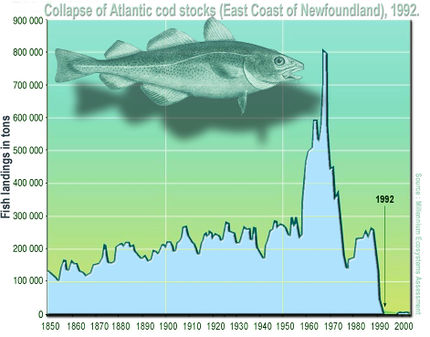Tragedy of the commons
When a common resource is used without restraint to the point where it has a negative effect on those who rely on it is said to be a tragedy of the commons. Because the resource is owned by everyone, that is, it is nonexcludeable individuals have no propensity or reason the use the resource in a conservative manner.[1] The overuse of the resource depletes it value over time.[2] Resources such as rivers, oceans, air (the atmosphere), forests etc. all suffer from this problem if it is not addressed in some way or another.
Overfishing

Overfishing is an example of the tragedy of the commons in that as fishing technology improves and the demand grows as the population expands, eventually the rate of fishing will exceed the rate of fish reproduction in the area. This reduces the food available for people as well as other animals in the area who rely on the fish for food.[4] Additionally, if the stocks are fished to depletion, the fishing industry will collapse, reducing the amount of food available to the population in the area and killing the industry jobs that existed before.
This exact scenario played out in the Atlantic cod industry in the 1970s. Atlantic cod had been fished in the area off the northeast coat of Canada/US since the 1850s but by the 1970s the stocks were over-exploited and to avoid a total depletion, a ban was instituted in 1992.[1]
Just as this scenario played out in the ocean, it can apply to the air we breathe and live in. The effects of air pollution are much more severe than losing a fish n' chips meal or job. The effects of air pollution are far reaching from respiratory disease to cancer.
Climate change coming from the emission of incredibly large amounts of CO2 is a classic example of the tragedy of the commons. The problems from ocean acidification and sea level rise to extreme heat and hurricanes will devastate the world if nothing is done. Unfortunately, these effects are much harder to combat than a simple ban of fishing.
See Also
References
- ↑ 1.0 1.1 M. Parkin and R. Bade. Economics: Canada in the Global Environment. Toronto: Pearson, 2013, pp. 398.
- ↑ A. Goolsbee, S. Levitt and C. Syverson. Microeconomics. New York: Worth Publishers, 2013, pp. 666.
- ↑ Wikimedia Commons. [Online], Available: https://en.wikipedia.org/wiki/Overexploitation#/media/File:Surexploitation_morue_surp%C3%AAcheEn.jpg[Aug 21, 2016]
- ↑ Investopedia. "Tragedy of the Commons." [Online], Available: http://www.investopedia.com/terms/t/tragedy-of-the-commons.asp?ad=dirN&qo=investopediaSiteSearch&qsrc=0&o=40186 [Aug 21, 2016].

